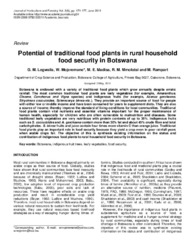| dc.contributor.author | Legwaila, G. M. | |
| dc.contributor.author | Mojeremane, Witness | |
| dc.contributor.author | Madisa, M. E. | |
| dc.contributor.author | Mmolotsi, R. M. | |
| dc.contributor.author | Rampart, M. | |
| dc.date.accessioned | 2020-07-09T06:09:56Z | |
| dc.date.accessioned | 2021-03-15T09:19:18Z | |
| dc.date.available | 2020-07-09T06:09:56Z | |
| dc.date.available | 2021-03-15T09:19:18Z | |
| dc.date.issued | 2011-06-11 | |
| dc.identifier.citation | Legwaila, G. M., Mojeremane, W., Madisa, M. E., Mmolotsi, R. M., & Rampart, M. (2011). Potential of traditional food plants in rural household food security in Botswana. Journal of Horticulture and Forestry, 3(6), 171-177. | en_US |
| dc.identifier.issn | 2006-9782 | |
| dc.identifier.uri | https://academicjournals.org/journal/JHF/article-abstract/71261EE1385 | |
| dc.identifier.uri | http://moodle.buan.ac.bw:80/handle/123456789/254 | |
| dc.description | This article is published under the terms of the Creative Commons Attribution License 4.0 | en_US |
| dc.description.abstract | Botswana is endowed with a variety of traditional food plants which grow annually despite erratic rainfall. The most common traditional food plants are leafy vegetables (for example, Amaranthus, Cleome, Conchorus and Vigna species) and indigenous fruits (for example, Azanza garckeana, Strychnos cocculoides, Sclerocarya birreaetc.). They provide an important source of food for people with either low or middle income and have been consumed for years to supplement diets. They are also a source of income; thereby improve the standard of living conditions for local communities. Traditional food plants contain vital nutrients and essential vitamins important for the proper maintenance of human health, especially for children who are often vulnerable to malnutrition and diseases. Some traditional leafy vegetables are very nutritious with protein contents of up to 36%. Indigenous fruits such as S. cocculoides and A. garckeana contain more than 30% fat and about 45% crude fibre and total carbohydrates. S. birrea fruits and juice contain four times more vitamin C than orange juice. Traditional food plants play an important role in food security because they yield a crop even in poor rainfall years when arable crops fail. The objective of this is synthesis existing information on the status and contribution of indigenous food plants to rural household food security in Botswana. | en_US |
| dc.language.iso | en | en_US |
| dc.publisher | Academic Journals | en_US |
| dc.relation.ispartofseries | Journal of Horticulture and Forestry;Vol.3(6), pp. 171-177 | |
| dc.subject | Indigenous fruit trees | en_US |
| dc.subject | Leafy vegetables | en_US |
| dc.subject | Food security | en_US |
| dc.subject | Botswana | en_US |
| dc.title | Potential of traditional food plants in rural household food security in Botswana | en_US |
| dc.type | Article | en_US |

